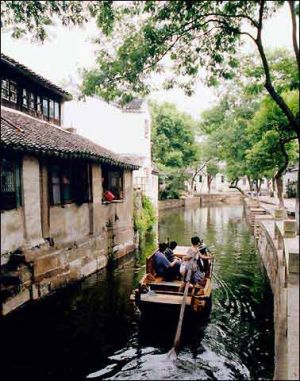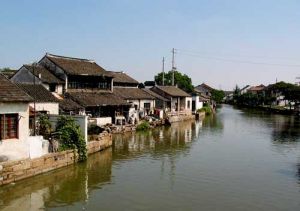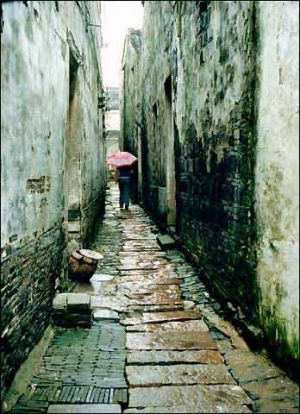Tongli
The 1000-year-old township of Tongli (同里古镇) took its original shape during the time of the Song Dynasty (960-1279). It is located 10 km west of Zhouzhuang and 18 km from Suzhou City. The community is surrounded by five lakes – Tongli, Jiuli, Yeze, Nanxing and Pangshan. It is a genuine water town, where waterside buildings are found everywhere. The township is administrated by Wujiang City of Suzhou, Jiangsu Province.
Tongli became a protected site in 1982, the first and only whole town under such protection in the province. In 1995, it was listed as a historical settlement of cultural interest. The Retreat and Reflection Garden in Tongli was inscribed in the UNESCO World Cultural Heritage List in 2000 as extension to the Classic Gardens of Suzhou.
Tongli is most characteristic in the following ways:
1.Its surrounding water and many bridges. There are more than 40 antique bridges in the town which are 100 or more years old, built in the era of feudal dynasties.
2.Its ancient buildings dating from the Ming and Qing dynasties. According to township records, 38 sizable residential compounds and 47 Buddhist or Taoist temples were constructed in the town during the years between 1271 and 1911.
3.It is the hometown of many historical literary figures. Since the Song and Yuan dynasties, a great number of writers retired to this peaceful town and built their houses and gardens here.
Contents
Tourist attractions
Local folks in Tongli proudly summarize their scenery spots as "one garden, two mansions and three bridges."
Retreat and Reflection Garden
The gem of all these spots is the Retreat and Reflection Garden. What makes the garden most distinctive is its waterside buildings and crosswise layout around a lake. The pavilions and houses by the water look as if they are floating on it, so people also call it the "floating garden."
Jiayin and Chongben Mansions
Jiayin Mansion is a four-courtyard compound built in 1922. The mansion as a whole has a magnificent and dignified manner. The main building follows the luxurious style of Ming Dynasty, ornamented by many fine woodcarvings. In front of the rear building, Yanqing Pavilion, there is an arch built with engraved bricks. Patterns are carved out of the paving stones in the courtyard. Sitting by the window of the waterside tower in the northwest, one can hear the wind blowing, stream murmuring and boats rowing by.
Chongben Mansion, constructed in the early 20th century, faces Jiayin across a stream. The five-house residence is laid out compactly. The mansion is famous for its rich decorations, with over a 100 carved ornamental fixtures inside the buildings. The buildings in the compound are separated by fireproof walls, and rainwater is kept in "wells" on each end of the porches in case of fire.
Taiping, Jili and Changqing Bridges
Right in the middle of the town where two streams meet, there are three ancient bridges – Taiping, Jili and Changqing. These stone structures – small and exquisite – are dearly treasured by local people. Since the bridges are believed to repel adversity and misfortune, it is a common practice for newlyweds to cross them during their wedding.
Stylish houses
The ordinary houses in Tongli, the majority dating back to the times of the Ming and Qing dynasties, are very attractive for tourists. Their unusual upturned eaves, as well as innovatively designed arches, overpass towers and glazed tile windows are all a charming expression of the water town's ancient culture.
Most of the buildings in the town are by water and their ornamented bricks even more admirable. Brick carving was used to decorate gateway arches, beams and screen walls. The pick of local brick carving art can be found on the Five-Crane Arch of the Zhus' House. But the best woodcarvings can be seen at Chongben and Jiayin mansions.
Traditions
Unique and rich traditions in Tongli have developed through its long history.
At the beginning of the year, the first thing local people do, customarily during the first five days of the lunar year, is to visit the South Temple and pray for peace. Dances of dragon lanterns, horse lanterns and lions are performed at the community's New Year night parties.
On the 15th day of the first lunar month, local people celebrate the Lantern Festival. Families get together in the evening and eat delicious sweet dumplings made of glutinous rice flour. Then, they go onto the street where shops and houses are decorated with lanterns and colorful streamers. The cheers of jubilant crowds are joined by music and drumbeats. Ensembles of traditional stringed and woodwind instruments play in the streets until midnight.
During the time between the Lantern Festival and the beginning of the third month is the busy "Spring Stage" season, when Peking operas are staged in Tongli. Local people, men and women, old and young, row their decorated "fast boats" to see one performance after another.
On the 28th day of the third lunar month, an event called "Zhutian Hui" is convened locally each year to commemorate Zhu Youjian, one of the emperors in the late years of Ming Dynasty. Participants tend to be older women, who enjoy sitting together on hassocks and eating vegetarian food.
The 14th day of the fourth lunar month is considered the day the immortals meet on the earth. People try to please them on the day with a parade, in which people walk on sticks, dance land-boat and clam-spirit dances.
Dragon-boat races are held in the fifth month every year. Since there are numerous bodies of water in Tongli, people are especially keen on it. The meticulously painted boats vie with each other to win races.
The 23rd day of the sixth month is the day of "letting the water dragons go." It is actually an annual fire control activity, when water is pumped from the "Great Temple" towards a stream. Large crowds of people join in and get themselves soaked wet by the "water dragons."
On the 30th day of the seventh month, the birthday of the legendary Dizangwang Bodhisattva (king of the underworld), families in Tongli light candles and burn incense in front of their houses or in their yards. Then, the candles are taken to a river or stream and set adrift. Thousands of drifting candles form a fabulous picture like a mobile starry sky.
The Mid-Autumn Festival on the 15th day of the eighth month is an important holiday in Tongli. When the sun is setting, families load their tables with all kinds of fruit, water chestnuts, lotus roots and other local foods. They enjoy the food and the beautiful full moon, but do not eat their moon cakes till midnight.
The 20th day of the last month is considered a "minor New Year." During the day, people give their house a thorough cleaning before sitting down and making rice flour dumplings with assorted sweet stuffings. They make rice flour cakes on the 28th day. The different flavored – some with sugar and osmanthus flowers, some with red beans and brown sugar – last till Lantern Festival of the coming year. On New Years’ Eve, families sit together and enjoy a sumptuous feast after working hard for a whole year. After dinner, they talk over rice wine until the New Year. Then the whole town comes out and burns New Year scrolls and firecrackers in celebration. Although the salvos shake the ancient town, happiness and peacefulness is shown on their faces.


